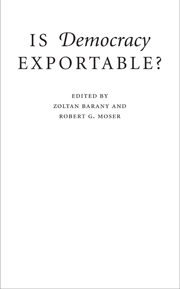Book contents
- Frontmatter
- Contents
- Contributors
- Acknowledgments
- Introduction
- A MORAL IMPERATIVE?
- STRUCTURAL PRECONDITIONS
- 2 Re-Integrating the Study of Civil Society and the State
- 3 Encountering Culture
- 4 Does Democracy Work in Deeply Divided Societies?
- 5 Democracy, Civil Society, and the Problem of Tolerance
- INSTITUTIONS AND PROCESSES
- Conclusion: Is Democracy Exportable?
- Bibliography
- Index
5 - Democracy, Civil Society, and the Problem of Tolerance
Published online by Cambridge University Press: 05 June 2012
- Frontmatter
- Contents
- Contributors
- Acknowledgments
- Introduction
- A MORAL IMPERATIVE?
- STRUCTURAL PRECONDITIONS
- 2 Re-Integrating the Study of Civil Society and the State
- 3 Encountering Culture
- 4 Does Democracy Work in Deeply Divided Societies?
- 5 Democracy, Civil Society, and the Problem of Tolerance
- INSTITUTIONS AND PROCESSES
- Conclusion: Is Democracy Exportable?
- Bibliography
- Index
Summary
INTRODUCTION
Whereas democracy may or may not be “exportable,” it is pretty clear that the civil society of any particular country or society most probably is not. This is especially the case if we take civil society to mean something beyond those institutional mechanisms that Robert Dahl (1972) identified with polyarchy. These institutional arrangements of: (1) elected officials; (2) free and fair elections; (3) inclusive suffrage; (4) the right to run for office; (5) freedom of expression; (6) alternative information; and (7) associational autonomy; may well be fundamental building blocks of democracy and, as such, universally realizable. The concept of civil society, however, would seem to point to something a bit more elusive and just possibly a bit more country specific and particularistic and, therefore, difficult to “export” in the same manner. How so?
All societies at all times face three fundamental challenges. These include the need to: (a) organize their division of labor; (b) to expand trust beyond the primordial unit of family (however conceived), that is, to generalize the terms of trust beyond the narrowest of circles; and (c) to provide some sense of meaning to both individual lives and collective endeavors (Eisenstadt 1995). All social institutions can be understood ultimately in terms of their reference to one or more of these three sets of challenges. What the notion of civil society adds to different sets of institutional solutions to these challenges is something overwhelmingly local in character.
- Type
- Chapter
- Information
- Is Democracy Exportable? , pp. 110 - 128Publisher: Cambridge University PressPrint publication year: 2009
- 1
- Cited by



